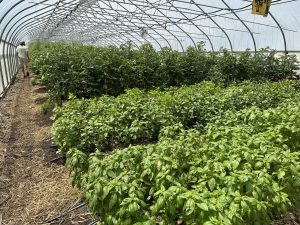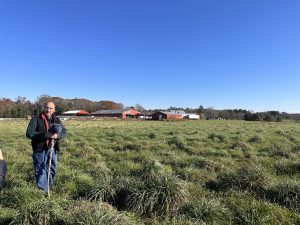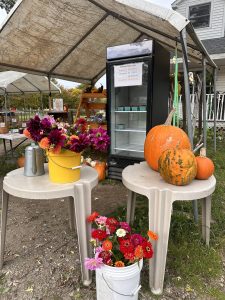Spring Webinar Series: Managing Farm Risk
 Risk Risk Risk…strategies on how to think ahead on your farm! In this spring webinar series, we will talk about Land Transitioning, Land Access Planning, Risk Mitigation, and Climate Resilience. We will hear from farmers, UMaine Extension, UNH Extension, Maine Department of Agriculture, Conservation and Forestry (DACF), Natural Resources Conservation Service (NRCS), and more. This webinar series is sponsored by the Maine Farmers Resource Network.
Risk Risk Risk…strategies on how to think ahead on your farm! In this spring webinar series, we will talk about Land Transitioning, Land Access Planning, Risk Mitigation, and Climate Resilience. We will hear from farmers, UMaine Extension, UNH Extension, Maine Department of Agriculture, Conservation and Forestry (DACF), Natural Resources Conservation Service (NRCS), and more. This webinar series is sponsored by the Maine Farmers Resource Network.
Free for all! Registration is required to receive updates and resources discussed at the farm visit.
Farm Visits for 2024: (On Zoom from 10 am – 11 am each day)
- April 26: Farm Practices for Managing Water
- May 10: Tax Implications for Farm Transitions
- May 24: Assessing Risk on Urban and Small Acreage Farms
- May 31: How to Talk About Money and Why It Matters
Farm Practices for Managing Water

Farm Practices for Managing Water Webinar
(Click the title to view the recorded webinar.)
Presenters: Ian Jerolmack (Stonecipher Farm) and Candi Gilpatric (NRCS)
This webinar will focus on soil health and engineering practices that can help farmers mitigate the negative effects of too much water. Participants will learn an overview of techniques, and important considerations for implementing these practices and will see how a Maine farm has employed some of these methods to fit the scale and goal of their farm.
Ian Jerolmack is the co-owner of Stonecipher Farm. Started in 2009, Stonecipher Farm is a certified organic mixed vegetable farm, dabbling in livestock and fruit, while focusing on storage vegetables, and tropicals such as ginger and turmeric. Year-round, and dedicated to their customers; Ian Jerolmack and Emily Goodchild serve many health food stores, but have made a real name for themselves serving all the best restaurants of Portland, as well as mid-coast Maine. Due to the coronavirus, the farmers were forced to pivot, launched a CSA, and now sell a lot to other farms. With 5 kids in tow, they farm full-time, and employ 5 full-time folks in summer, and 2 in winter. They have an acre of greenhouse space and are hoping to work more in there, really maximize the shoulder seasons, and maybe one day, take it easier in the summer. They started the farm on blank land, and the longer they are there, the more the entire project pleases them, as trees grow, the land improves, buildings are finished and employees come back. Ian and Emily feel this place is growing a legacy, and hope to help that carry on to their kids, for the perpetual benefit of the community.
Tax Implications for Farm Transitions

Tax Implications for Farm Transitions Webinar
(Click the title to view the recorded webinar.)
Presenter: Mike Sciabarrasi, UNH Extension
Decisions regarding farm property transfer are critical in estate, retirement, and succession planning. Making the best decisions starts with understanding the different ways of transferring property ownership and the common “tools” used to facilitate farm property transfer.
From 1980 to 2016, Mike Sciabarrasi was an Agricultural Business Management Extension Specialist at the University of New Hampshire, leading statewide and regional educational programs in agricultural finance, farm business planning, estate and succession planning, and risk management. In retirement, Mike continues to support state and regional Extension programs in farm business management. Recent projects include the Northeast efforts to establish benchmarks for diversified direct-market farms; evaluation of farm financials under several University and state-funded efforts; and, income tax education for farmers in New Hampshire and Maine.
Assessing Risk on Urban and Small Acreage Farms

Assessing Risk on Urban and Small Acreage Farms Webinar
May 24, 2024
10:00 a.m. – 11:00 a.m.
Presenter: Carrick Gambell, Urban Agriculture Professional, UMaine Extension/NRCS Joint Appointment
Urban agriculture: Did you know it’s happening all over Maine? From quarter-acre flower farms to community orchards to backyard gardens, Mainers are growing large quantities of food in our towns and cities. While urban growers face climate-related challenges, urban agriculture is itself a pathway to climate resiliency. This presentation will detail the state of urban agriculture in Maine, risks faced by urban growers, and the role urban ag can play in building climate resilient communities. The presentation will also discuss USDA-NRCS assistance opportunities for urban agriculture.
Carrick is working in a joint position with the USDA Natural Resources Conservation Service and UMaine Extension as their urban agriculture professional. He provides technical assistance, program planning, and outreach to Maine’s urban farmers and gardeners. Carrick has worked as a teacher and urban farmer, and continues to grow food for his family and community members in Southern Maine.
How to Talk About Money and Why It Matters

How to Talk About Money and Why It Matters Webinar
May 31, 2024
(This webinar was not recorded, but Leslie and Sylvie would like you to watch their “Personal Money Values Video Series.”)
Presenters: Leslie Forstadt, UMaine Human Development Specialist and Sylvie Boisvert, Farm Coach and Business Advisor
A discussion of all things farm finance – not strictly farm business in nature, specifically personal finances, decision-making, communication, and planning. This session will offer short video interviews with farmers and provide an opportunity for conversation about farms and money. This webinar is for experienced (5 years+) farmers. You’ll hear directly from farmers who have thought about the non-business side of money. You’ll think about your own priorities and have a chance to reflect about how you’d like to move forward with your personal time and value in mind just as much as your business value. You’ll learn about the option of farm coaching for continued support in your planning.
Leslie Forstadt, PhD, Extension Professor, Human Development Specialist, conducts educational programs and research about farm/family balance, communication skills, and stress and resilience. She is the Director of the Maine Agricultural Mediation Program and a member of the farm coaching team. She is one of the authors of the Toolkit for Agricultural Service Providers and the Guide to Farm Communication Coaching.
Sylvie Boisvert is a farm coach and business advisor. She works with small businesses, farms and non profits helping them to reach their goals. Her approach is focused on helping owners and operators determine what success means to them and how to get there. Her goal oriented approach often involves grant writing, business redesign and succession planning. She is primarily focused on work life balance and preserving small businesses, nonprofits and farms in Maine. On addition, she is currently working on a clinical mental health internship.
